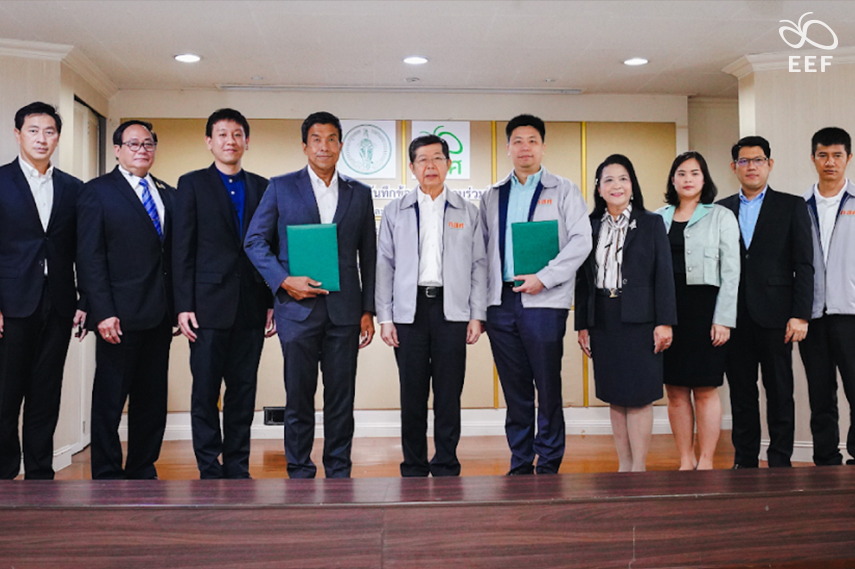
The Bangkok Metropolitan Administration (BMA), together with EEF, signed a memorandum of cooperation on the development of educational equality guarantees in Bangkok. BMA Governor Mr.Chadchart Sittipunt adheres to the importance of both education and infrastructure and accelerates the commitment towards equality with EEF, so that all children in society can have access to educational resources and opportunities. This should start from early childhood until higher education throughout a period of 20 years through innovation and policy development using evidence-based information to sustainably resolve systemic problems towards a model city of educational equality.
On October 20, 2022, at the Chao Phraya Conference Room, Bangkok City Hall (Sao Chingcha), the Equitable Education Fund Thailand (EEF) signed a memorandum of understanding with the Bangkok Metropolitan Administration (BMA) for the development of educational equality guarantees, as well as qualified teachers and educational institutions to the needy, disabled, underprivileged, as well as the of quality teacher education institutions. The signing of the memorandum of understanding was led by Mr. Chadchart Sittipunt, Governor of Bangkok Metropolitan Administration, Mr. Sanon Wangsrangboon, Deputy Governor of Bangkok Metropolitan Administration, and administrators of the Bangkok Education Office, along with Dr. Prasarn Trairatvorakul, Chair of EEF’s Board of Governance, Dr. Kraiyos Patrawart, Managing Direct of EEF, Mr. Pattanapong Sukmadan, Assistant Managing Direct of EEF, Dr. Udom Wongsingh, Director of the Office of Teacher and Educational Quality Development of EEF and Ms. Kanittha Kunawisarut, Acting Director of the Bureau of Educational Opportunity Security Development of EEF.
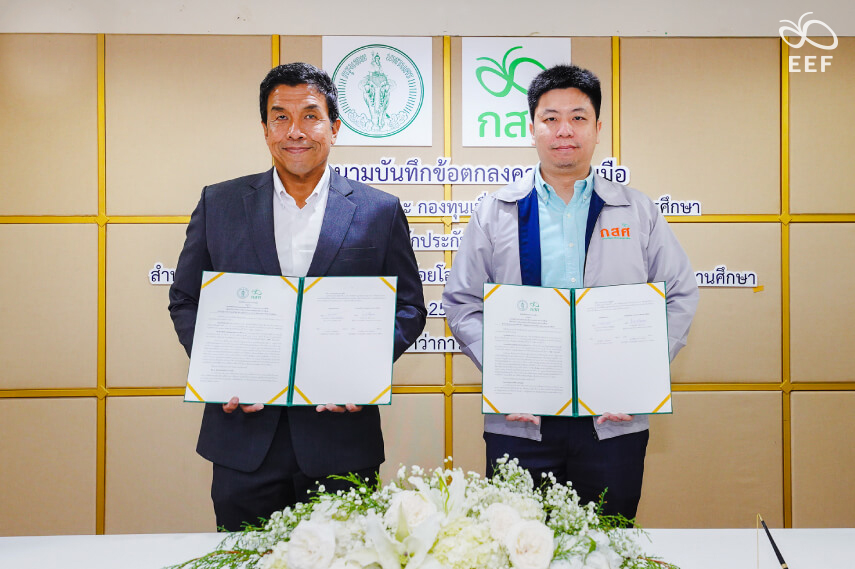
Mr. Chadchart Sittipunt, BMA Governor, said that one of the educational policies which BMA adheres to as a working principle is “alternative education and guidelines for supporting children who drop out of the system.” It is a policy to reduce inequity and prevent students from dropping out of the education system. In education, BMA has 437 schools under its supervision. Most of them are at the elementary level, which is an important stage of development. If children dropped out of the system, the chance to bring them back is difficult. This is true not only for elementary school children but also for the management needs to start planning before birth. If children are not well taken care of during each developmental stage, the negative impact will continue on higher education.
“BMA must manage quality education like other infrastructure developments, with a social contract or social commitment. It is a promise to the people that we will treat everyone equally on their right to education and equality in public health. Any investment for children and their families today will be a return on investment to the city and the country in the future. If children can reach their full potential development, they will be part of the city to create jobs, build careers, become the city’s tax base and take care of others. Thus, investment in education is considered to have the highest return, which may not be a matter of money but a way towards reducing inequality in society”.
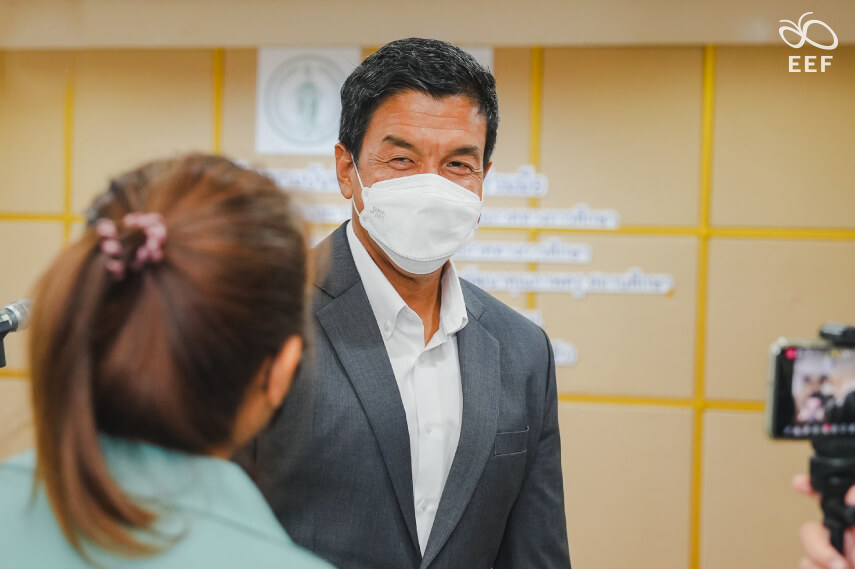
Mr. Chadchart Sittipunt, BMA Governor
The BMA Governor said that Thailand used to be faced with various situations in the past which affected the economic stability of almost every household. This also caused some students to drop out of the education system. While such a policy would help students to return to school again. If students dropping out of the education system wish to return to study at the same schools, the BMA will support their returning to schools free of charge in accordance with the policy of ‘free classes, free uniforms, no additional charges’ to relieve the parents’ burdens. Especially, underprivileged children and youth in families with household incomes below the country’s poverty line are considered a group with high burdens of educational expenses.
In the academic year of 2022, the BMA collaborated with EEF to screen students in its affiliates in the special poverty level or a group with a household income of no more than 3,000 THB per person per month. Thus, there are a total of 6,159 students who have received scholarships to support their education and those scholarships will continue every academic year. In addition, a joint development of an information system database would be conducted to link the databases as tools for poverty screening. This also includes a budget allocation to help children and youth in vulnerable groups. BMA is willing to support the operations of EEF and work together to reduce inequality, create opportunities and increase educational equity, including career promotion as well as research and development of knowledge and innovation related to the quality development of teachers and schools in BMA affiliates according to the objectives of the memorandum of cooperation.
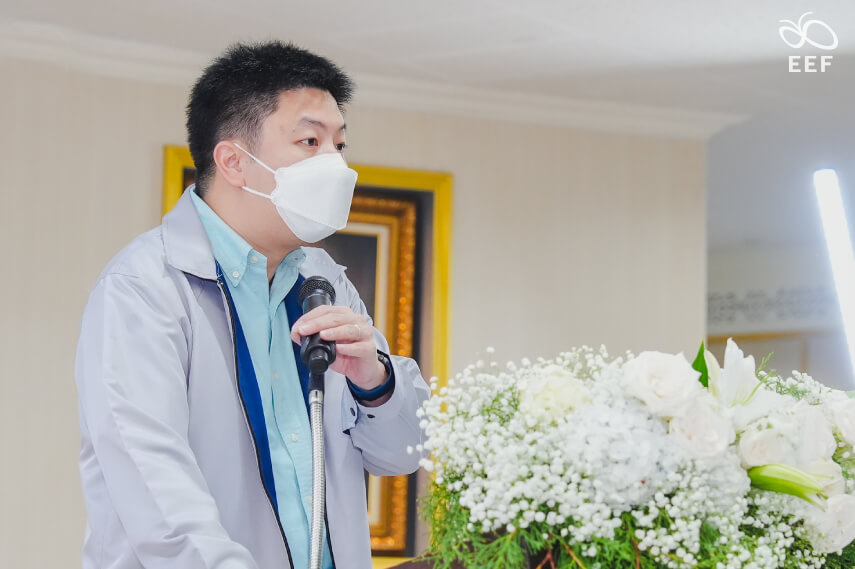
Dr. Kraiyos Patrawart, Managing Direct of EEF
Dr. Kraiyos Patrawart, Managing Direct of EEF, said that the signing of the memorandum of cooperation between EEF and BMA this time has been performed in compliance with the intention of EEF establishments to promote educational equity and give the right to people for equal and universal access to education and development, particularly the needy and the underprivileged. This includes the enhancement and development of quality and efficiency among teachers in accordance with the objectives in Section 5 of the Equitable Education Fund Act B.E. 2561 (2018), which requires EEF to work with relevant agencies, such as the government and private or civil sectors to achieve efficiency, effectiveness, and sustainability. This memorandum of cooperation has a period of 3 years with 5 important objectives as follows:
- Support the poverty screening innovation, conditional cash transfer program, and tracking system of educational institutions under BMA to reduce educational inequity and help children and youth who are the needy, underprivileged and disabled students in accordance with the aptitudes and self-development of each individual potential.
- Promote educational opportunities for the needy, underprivileged, and disabled children, youth, and students to study at a higher educational level according to their potential.
- Enhance the development of teachers and educational institutions under BMA in accordance with the needs and quality development of students.
- Integrate a database of assistance to the needy in preparation for policy proposals to increase opportunities for quality education.
- Encourage any other assistance-related cooperation efforts to support the needy, underprivileged and disabled students, as well as reduce inequity in education until completing their basic education and develop the quality and efficiency of teachers in educational institutions under BMA.
“Under this cooperation, the EEF and BMA will cooperate with the Office of Education, district offices, and educational institutions under BMA in joint research and development of a model for the educational opportunity guarantee system to prevent children and youth in educational institutions under BMA from dropping out of the educational system. This consists of developing and linking the database and information systems of BMA and EEF, as well as establishing guidelines for developing a care system and passing on opportunities for children and youth who are needy, disabled, and underprivileged both in and outside the educational system to receive higher educational opportunities other than just compulsory. This is so that they can receive education or development for their knowledge and ability to pursue careers according to their aptitudes and rely on themselves in life, including assistance to go through various situations and crises, etc.”
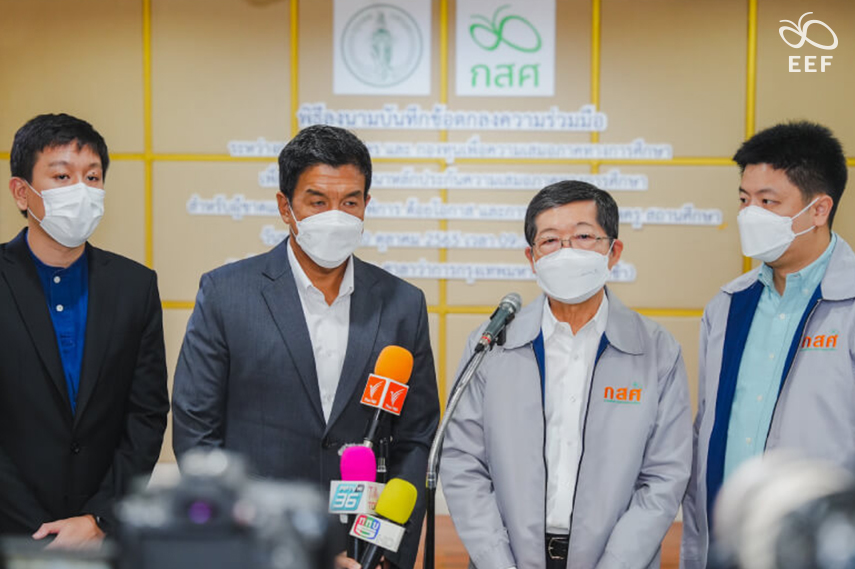
Dr. Kraiyos added that EEF will support measures to reduce inequity in 3 important target groups in Bangkok. For instance, students in educational institutions under BMA will obtain support for the target group data screening tool, information database system, and conditional cash transfer program with equal scholarship opportunities according to the rules, criteria, methods, and procedures of EEF.
School-age youth outside the educational system of BMA will receive support for mechanisms to assist children and youth in crises among educational institutions under BMA according to the rules, criteria, methods, and procedures of EEF for the affected children and youth toward a return to normal or continuing education according to their own potentials or contexts.
Teachers and educational institutions under BMA will receive support for the development of teachers and educational personnel in all 50 model educational institutions under the BMA towards the expansion of results to improve the learning quality of children and youth. In addition, the EEF and its associated organizations, both domestic and international, will support academic knowledge innovation to reduce inequity in education, follow up on the performance of this collaboration, as well as drive policy proposals for equity in education at both the national and international levels.
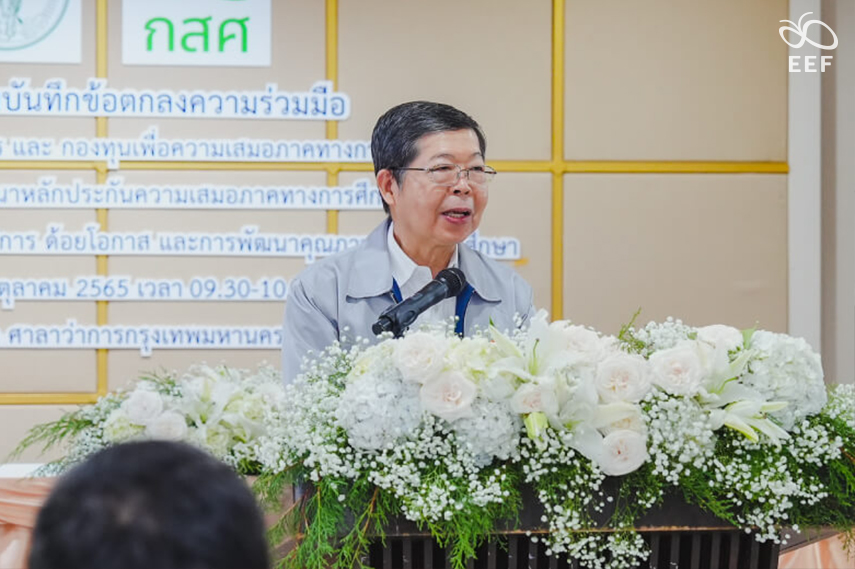
Dr. Prasarn Trairatvorakul,
Chair of Equitable Education Fund’s (Thailand) Board of Governance
Dr. Prasarn Trairatvorakul, Chair of Equitable Education Fund’s (Thailand) Board of Governance, said that the cooperation between EEF and BMA has been done at a critical time in the educational system amidst economic challenges. According to data analysis of EEF, the educational expenses for students under 15 years of age in Bangkok are 2 times higher than the national average. When comparing the expenses of education for children from the bottom 10% of poor households in Bangkok and the top 10% of wealthy households, there is a higher gap of 12 times.
“The screening of students in the first semester of the 2022 academic year revealed that those in educational institutions under the BMA are in the exceptionally poor status, accounting for 15%. These students are in families with an average household income of only 1,551 THB per person per month, lower than the poverty line reported by the Office of National Economic and Social Development Council or 2,762 THB per person per month.”
Dr. Prasarn Trairatvorakul, Chair of Equitable Education Fund’s (Thailand) Board of Governance, added that granting funds for working on educational inequity is only part of the solution. Supporting and helping young people to continue on their educational journey requires cooperation from many parties. Just as the African wisdom that says “It takes a village to raise a child,” this simply means raising a child requires the entire village.
In the past, EEF has applied the Area-Based Education (ABE) approach to integrate cooperation among government agencies, the private sector, civil society, academic units, and local government organizations by using ‘data as a base to support the work in reducing educational inequity in different areas of Thailand. The key point of ABE’s work is to reduce the scale of educational problems from the national level down to the provincial level. This is to promote job opportunities toward more sustainable success under this memorandum of cooperation. Then, the BMA can be a role model to other provinces or cities, nationally and internationally, in the near future.
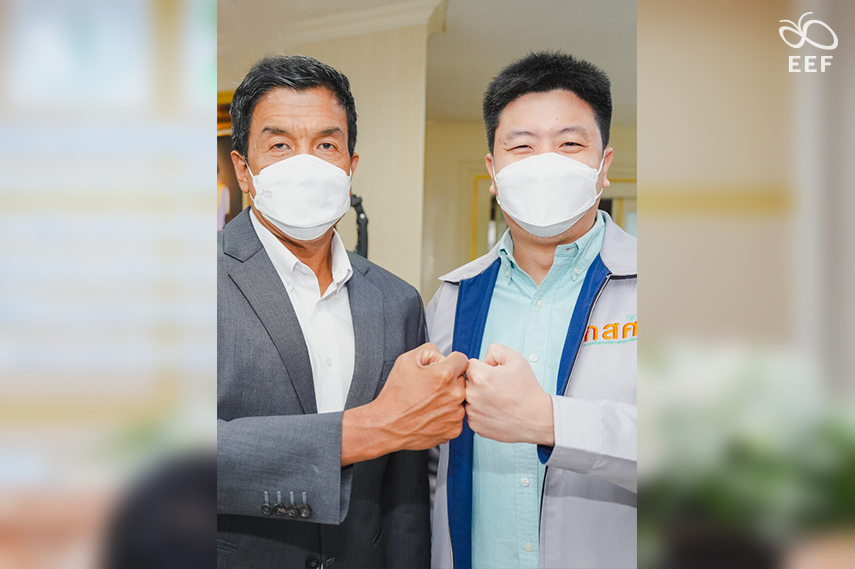
“The Educational Opportunity Security System that EEF will work with BMA can help pass students who receive scholarships to access resources and opportunities for higher education from early childhood to higher education throughout a period of 20 years. In the near future, the educational system of BMA will ensure that children and youth from all families have equal rights and achieve their highest educational goals. This does not only belong to one child but also achieves the city and the country’s goals that the educational system will ensure everyone’s access to the change in their family’s social status until the end of the poverty cycle by passing down just only one generation to the next generation.”
In this regard, EEF has developed a system for the security of educational opportunities which connects the database of students and educational institutions under BMA and the concerned agencies to support Social Protection in the Educational System under 5 areas: 1) food security; 2) stability of family institution; 3) readiness and safety in traveling to school; 4) readiness and safety of educational institutions and teachers, and 5) readiness of local communities in supporting educational and family institutions in terms of resources and other operations.
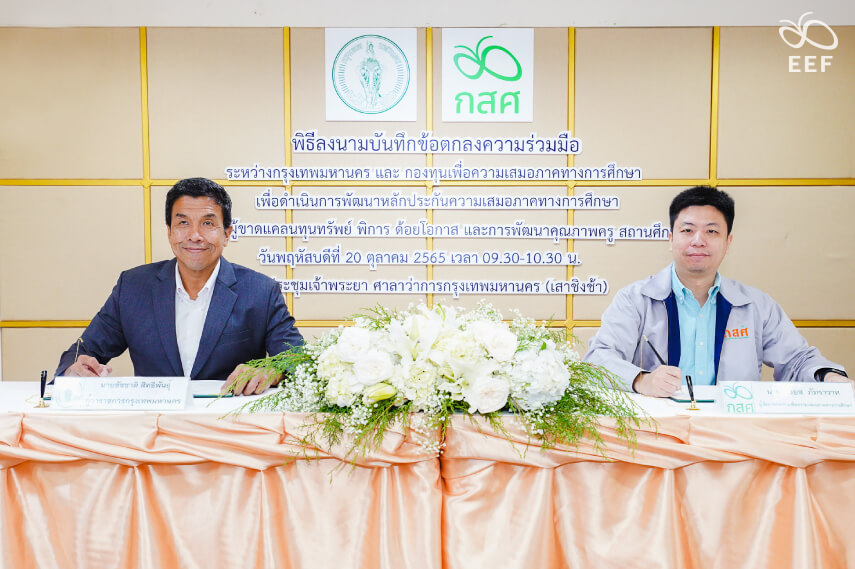
In addition, EEF and BMA will work together to support teachers by cooperating with the Bangkok Office of Education to bring innovation for the whole school quality development system or TSQP towards research to build up knowledge with 50 pilot schools under BMA Bangkok to foresee the direction of development that is consistent with the urban contexts, leading to changes and policy proposals for teacher development and schools under the BMA. This memorandum of cooperation will mark the development of innovations and evidence-based policies to sustainably resolve systemic problems, which can lead to a model city with educational equity.

